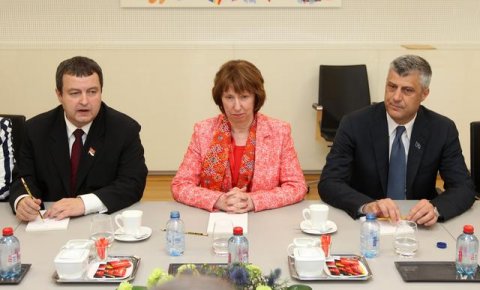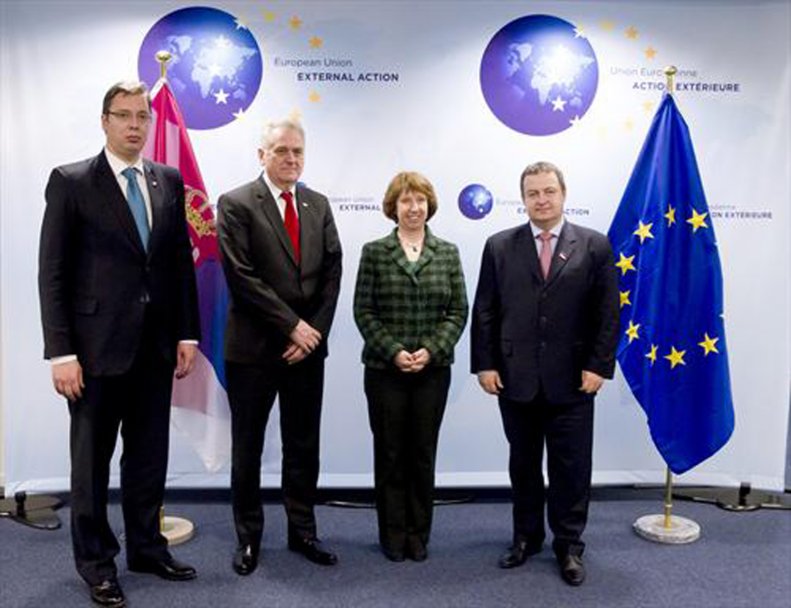| NSPM in English | |||
Serbia should ‘’Icelandize’’ its European policy |
 |
 |
 |
| петак, 12. јул 2013. | |
|
(Independent Balkan News Agency, 1. 7. 2013)
The officials of the Serbian Government are claiming that there will be no further preconditions for the start of the talks. Are they right?
Do you think that EU will accept German idea? “I am sure that the EU will follow German position. This is usual practice in Bruxels. Any unbiased observer would say that by this approach EU requests from Serbia to recognize the independence of Kosovo. Bundestag declaration means that the EU will demand from Serbia to accept the entering of Kosovo into international organizations, including UN, to sign an “agreement on good neighbourly relations and status of national minorities”, to establish diplomatic relations etc. I even think that certain other EU member states, not only Germany, sooner or later, will make their own preconditions for Serbia. They will not support Serbian progress towards the EU without fulfilling these preconditions.” You consider the Brussels agreement as a dictate. Do you find that Serbia had a different choice?
What could be the consequences for the current Serbian government in case that it had been refused the EU demands regarding Kosovo? „I think that this government went too far, too rapidly. Why they have decided to rush into negotiations at the highest level? If the highest ranking officials make a wrong decision, nobody can correct it. The alternative solution was to conduct constructive policy towards the EU, but without rushing and without surrendering vital state and national long term interests. This approach could imply openness for membership but not for dictate and blackmail. By intensifying the economical and other relations with BRICS countries, as well as with the Arab and Latin American countries, Serbia could strengthen its position towards the EU. Accepting the Brussels agreement under the conditions imposed by the EU will be remembered as historical step, but unfortunately, wrong one.“ Do you think that current EU „sticks and carrots“ policy towards Serbia is similar to Western policy in Yugoslavia during the 90s?
What will the Croatian entry into EU bring to Serbia? „Croatia is our neighbour country and we should build good relations together. The basic principle in this cooperation should be the reciprocity. Nevertheless, Serbia has allowed Croatia unilateral concessions thus far. Croatian companies have purchased both Serbian factories and the agricultural resources’ of the highest quality. Croatian businessman Ivica Todoric controls more than a third chain market`s in Serbia. On the other hand, Serbian companies are not allowed to invest in Croatia. Serbs in Croatia are discriminated; barriers for the return of Serbian refugees forced out in 90-ies are still there. The part of the border between Serbia and Croatia is still undefined, because Croatia has pretensions that are contrary to international law. All this is certainly not in compliance with the standards of EU. Milos Mitrovic |
Од истог аутора
Остали чланци у рубрици
- Playing With Fire in Ukraine
- Kosovo as a res extra commercium and the alchemy of colonization
- The Balkans XX years after NATO aggression: the case of the Republic of Srpska – past, present and future
- Из архиве - Remarks Before the Foreign Affairs Committee of the European Parliament
- Dysfunction in the Balkans - Can the Post-Yugoslav Settlement Survive?
- Serbia’s latest would-be savior is a modernizer, a strongman - or both
- Why the Ukraine Crisis Is the West’s Fault
- The Ghosts of World War I Circle over Ukraine
- Nato's action plan in Ukraine is right out of Dr Strangelove
- Why Yanukovych Said No to Europe

.jpg)








 “After European Union Council had announced the start of the accession negotiations with Serbia, the statements by the EU representatives in this regard were mainly general. They said that the talks will start at the latest in January 2014, but it is not clear what the EU Council will discuss in December. However, we can assume that the issue will be complete and continual implementation of the Brussels agreement about the normalization of the relations between Belgrade and Priština. I think this is for certain, especially given the fact that the implementation of the Brussels agreement was the main demand of the German Parliament in the first place”, Živadin Jovanović, former Yugoslav Foreign Minister (1998 – 2000) said in the interview for IBNA. Jovanović is President of Belgrade Forum of the world of equals, since 2005.
“After European Union Council had announced the start of the accession negotiations with Serbia, the statements by the EU representatives in this regard were mainly general. They said that the talks will start at the latest in January 2014, but it is not clear what the EU Council will discuss in December. However, we can assume that the issue will be complete and continual implementation of the Brussels agreement about the normalization of the relations between Belgrade and Priština. I think this is for certain, especially given the fact that the implementation of the Brussels agreement was the main demand of the German Parliament in the first place”, Živadin Jovanović, former Yugoslav Foreign Minister (1998 – 2000) said in the interview for IBNA. Jovanović is President of Belgrade Forum of the world of equals, since 2005. „These comments are directed to Serbian public. The officials want to send the message to the people that Serbian policy concerning the EU thus far was adequate and that it was fruitful. Nevertheless, I believe that situation is not so simple at all. There are no reasons to be satisfied with the EU decision, not to mention celebrations. Serbia is going to face new tough demands. Serbian Government accepted EU policy that had tied the accession talks with Serbia with the issue of Kosovo which is wrong. Such an approach is unprecedented in the history of the EU enlargement process. And now we can see – according to German Bundestag decision – that even the new negotiation chapter on relations between Belgrade and Priština will be introduced.“
„These comments are directed to Serbian public. The officials want to send the message to the people that Serbian policy concerning the EU thus far was adequate and that it was fruitful. Nevertheless, I believe that situation is not so simple at all. There are no reasons to be satisfied with the EU decision, not to mention celebrations. Serbia is going to face new tough demands. Serbian Government accepted EU policy that had tied the accession talks with Serbia with the issue of Kosovo which is wrong. Such an approach is unprecedented in the history of the EU enlargement process. And now we can see – according to German Bundestag decision – that even the new negotiation chapter on relations between Belgrade and Priština will be introduced.“ „The Icelandization of Serbian policy regarding the EU was an alternative. This approach implies cooling-down the whole process of endless unilateral concessions to EU, USA and Prishtina, intensify economic and other ties with Russia, China, India and all countries supporting Serbia`s sovereignty and territorial integrity and to start activating own economic, natural, humane and geostrategic capacities which are not negligible. Serbian officials, to my opinion, made serious mistake by trading Serbian legitimate rights in Kosovo and Metohija for the accession talks date. We will see what will be the final price of the Serbian EU membership. For instance, Serbian public is not aware that Germany, Austria, may be even Hungary, may request compensations for Volksdeutsche (Germans which were expelled from Serbia in the end of the Second World War as collaborators of occupying fascist’s forces).
„The Icelandization of Serbian policy regarding the EU was an alternative. This approach implies cooling-down the whole process of endless unilateral concessions to EU, USA and Prishtina, intensify economic and other ties with Russia, China, India and all countries supporting Serbia`s sovereignty and territorial integrity and to start activating own economic, natural, humane and geostrategic capacities which are not negligible. Serbian officials, to my opinion, made serious mistake by trading Serbian legitimate rights in Kosovo and Metohija for the accession talks date. We will see what will be the final price of the Serbian EU membership. For instance, Serbian public is not aware that Germany, Austria, may be even Hungary, may request compensations for Volksdeutsche (Germans which were expelled from Serbia in the end of the Second World War as collaborators of occupying fascist’s forces). „There are many similarities. Generally, EU practices a racist policy toward Serbia. During the 90s sticks were isolation, sanctions and even, direct military aggression in alliance with the terrorist UCK. At this moment, circumstances are different - there are no sanctions, isolations threat of aggression. Neither EU, nor NATO have monopoly in European or world relations, be they economic, political or strategic. Serbia is member of most important international organizations, has many friends. Her interests and rights in Kosovo and Metohija are guaranteed by UN SC resolution 1244. Thus, Serbia has more opportunities to demand and reach just compromise. Yet, somehow, Serbia is more opened and more subjected to dictate. I am not sure whether the Brussels agreement will provide stability in the region or create the foundation for the new strives in the future. “
„There are many similarities. Generally, EU practices a racist policy toward Serbia. During the 90s sticks were isolation, sanctions and even, direct military aggression in alliance with the terrorist UCK. At this moment, circumstances are different - there are no sanctions, isolations threat of aggression. Neither EU, nor NATO have monopoly in European or world relations, be they economic, political or strategic. Serbia is member of most important international organizations, has many friends. Her interests and rights in Kosovo and Metohija are guaranteed by UN SC resolution 1244. Thus, Serbia has more opportunities to demand and reach just compromise. Yet, somehow, Serbia is more opened and more subjected to dictate. I am not sure whether the Brussels agreement will provide stability in the region or create the foundation for the new strives in the future. “











